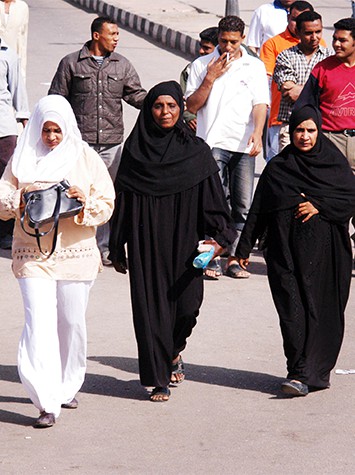Recently, there have been calls for a protest to demand that women take off their veils. First off, to make things clear, the protest never claimed that it aims to force women to abandon the veil, but to demand that those who want to do so, can do it without being shamed by their families and society.
The protest gained notoriety in no time, and suddenly everyone was talking about it; whether they supported it, or were against it, everyone had an opinion about this seemingly urgent issue. A lot of the controversy stemmed from articles which misquoted the journalist who called for the protest in the first place, Cherif Elchoubachy. Those articles claimed that Elchoubachy said “90% of veiled women are whores”, something which he has repeatedly denied.

Al Azhar was openly against the protest, but other than that, the reactions varied greatly. Egyptian activist, Salley Zohney was shocked by Hoda Badran’s support to what she thought is a superficial aspect of feminism. While, Zeinobia wondered if those who are calling for the protest will do the same for female political prisoners and women in impoverished communities.


But is it? At first glance, it might seem like the answer to many an Egyptian woman’s prayers, but is it, really? Let’s address all the factors before we cast our judgement. Yes, the idea of being modest, and covering their hair, has been promoted vigorously to women since the 1980s. And now, the majority of Egyptian women end up wearing the veil by the time they reach puberty. Yes, many women don’t have a choice. However, are those who are calling for the protests unable to choose for themselves?
Frankly, that doesn’t appear to be the case. The women calling for this protest are doing so with the best intentions in mind, but they seem to be unaware of the fact that even if their protest gives some of their veiled friends – who would like to take off the veil, but are worried about people’s reactions – the courage to take it off, it will most probably not enable the majority of women to do that. A woman living in the slums of Cairo will not gain courage when residents of Zamalek and Maadi tell her it’s okay to take off her veil. Why? Because where she lives, their encouragement means nothing. Where she lives, the veil is worn for protection.
How about instead of focusing on this, we take a look at what women really need? First of all, it’s clear they need protection. They need the law to protect them for sexual harassment, domestic violence, forced marriage and FGM. And that is just scratching the surface.
The average Egyptian woman cannot take the veil off if she wants to because she might get beaten up by her father or husband, who will not be punished by the law. She might be subjected to sexual violence, too, for which the culprit will most likely go unpunished. Women need to first realize that they will not be harmed on Egyptian streets, and then the freedom to dress as they please – be it veiled or not – will come naturally.
Women need to be properly represented in the government in order for them to be given equal rights. What would a woman do with the call to take off her veil, if she cannot extract a birth certificate for her children without her husband’s consent? What would she do with it, when she cannot give her citizenship to her husband, when she gets paid less for the same job a man does, when she is shamed, harassed, beaten, and raped?
It all comes down to two things: education, and awareness. UN Women has launched a campaign to raise awareness about all the trouble women go through in Egypt, just because of their gender, using the hashtags #????_???_????? and #????_???_???. The campaign focuses on gender equality and violence against women. And although it’s being supported by many in Egypt, even Enactus, a Cairo University based Non-profit Organization, is helping out, it is still not getting as much attention as the “veil debate”.
Sadly, the world will not pay attention to something that is not as sensational as the protest in question. This is not to belittle protests, or the right to take off the veil if a woman so pleases. However, it is paramount that we do not lose sight of issues that are far more pressing to the average Egyptian woman.
No one can deny the psychological pressure some women face when they decide to take off their veil, but at the end of the day the ones who can protest about this, have the choice. Isn’t it time to look at those who don’t have this choice, and to finally see why they don’t get to choose who they marry, let alone how they dress?

